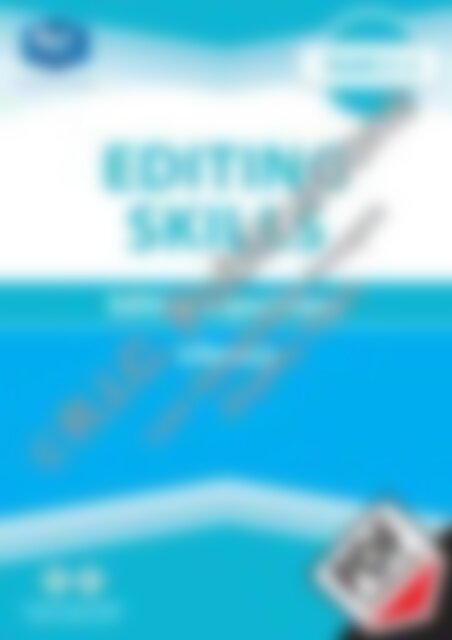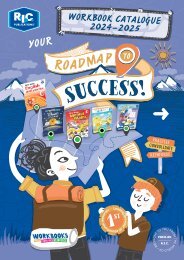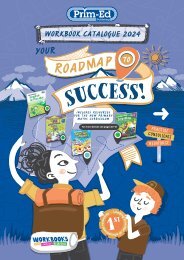20853_Editing_expositions_Years_2_and_3
You also want an ePaper? Increase the reach of your titles
YUMPU automatically turns print PDFs into web optimized ePapers that Google loves.
Your partner in education<br />
YEARS 2–3<br />
EDITING<br />
SKILLS<br />
<strong>Editing</strong> <strong>expositions</strong><br />
Literacy<br />
Australian Primary Publisher<br />
of the Year 2015 <strong>and</strong> 2016
EDITING SKILLS (Ages 8–9)<br />
Published by R.I.C. Publications ® 2005<br />
Copyright © R.I.C. Publications ® 2005<br />
RIC–<strong>20853</strong><br />
This master may only be reproduced by the<br />
original purchaser for use with their class(es). The<br />
publisher prohibits the loaning or onselling of this<br />
master for the purposes of reproduction.<br />
Copyright Notice<br />
Blackline masters or copy masters are published <strong>and</strong><br />
sold with a limited copyright. This copyright allows<br />
publishers to provide teachers <strong>and</strong> schools with a<br />
wide range of learning activities without copyright<br />
being breached. This limited copyright allows the<br />
purchaser to make sufficient copies for use within<br />
their own education institution. The copyright is not<br />
transferable, nor can it be onsold. Following these<br />
instructions is not essential but will ensure that you,<br />
as the purchaser, have evidence of legal ownership<br />
to the copyright if inspection occurs.<br />
For your added protection in the case of copyright<br />
inspection, please complete the form below. Retain<br />
this form, the complete original document <strong>and</strong> the<br />
invoice or receipt as proof of purchase.<br />
Name of Purchaser:<br />
Date of Purchase:<br />
Supplier:<br />
School Order# (if applicable):<br />
Signature of Purchaser:<br />
Internet websites<br />
In some cases, websites or specific URLs may be recommended. While these are checked <strong>and</strong> rechecked at the<br />
time of publication, the publisher has no control over any subsequent changes which may be made to webpages.<br />
It is strongly recommended that the class teacher checks all URLs before allowing students to access them.<br />
View all pages online<br />
http://www.ricgroup.com.au
Foreword<br />
<strong>Editing</strong> skills consists of a selection of texts written in specific formats to provide punctuation,<br />
spelling <strong>and</strong> grammatical practice. Detailed descriptions of concepts, such as specific<br />
parts of speech <strong>and</strong> punctuation, are also included, as well as vocabulary enrichment <strong>and</strong><br />
aspects of writing.<br />
The aim is to provide students with varied, structured experiences in proofreading <strong>and</strong><br />
editing written texts. A high level of proficiency in these skills is vital for accurate selfmonitoring<br />
of written work.<br />
Other titles in this series are:<br />
• <strong>Editing</strong> skills 6–7<br />
• <strong>Editing</strong> skills 10–11<br />
• <strong>Editing</strong> skills 11+<br />
Contents<br />
Teachers information<br />
Teacher information................................................................................................................... iv – v<br />
Curriculum links................................................................................................................................ v<br />
Overview of activity content.......................................................................................................vi–vii<br />
Punctuation, spelling <strong>and</strong> grammar information......................................................................viii–ix<br />
Writing format information......................................................................................................... x– xi<br />
Writing format checklists .................................................................................................... xii – xviii<br />
Student proofreading <strong>and</strong> editing checklist.................................................................................. xix<br />
Worksheets<br />
The blue whale.......................................... 2–3 The Trojan horse.................................. 44–45<br />
Peep loses sheep...................................... 4–5 Pottery places........................................ 46–47<br />
Snake bites................................................ 6–7 Monkeynaut............................................ 48–49<br />
Chocolate.................................................. 8–9 The bear <strong>and</strong> the tourists..................... 50–51<br />
The wind <strong>and</strong> the sun............................10–11 How plants drink.................................. 52–53<br />
Anzac biscuits........................................12–13 My pop.................................................. 54–55<br />
Alaskan holiday......................................14–15 Biography of Sir Edmund Hillary......... 56–57<br />
Pet parade...............................................16–17 Kakadu National Park........................... 58–59<br />
The gecko.............................................. 18–19 Water <strong>and</strong> the body.............................. 60–61<br />
Fish for classroom pets......................... 20–21 My dance trophy.................................. 62–63<br />
The egg <strong>and</strong> bottle experiment............ 22–23 Make-a-face flick book......................... 64–65<br />
Explorer’s diary..................................... 24–25 Too many dogs..................................... 66–67<br />
The beach.............................................. 26–27 Sabre-toothed cat................................ 68–69<br />
Elephants can fly!.................................. 28–29 Life cycle of a butterfly......................... 70–71<br />
How a thermometer works................... 30–31 Save our water..................................... 72–73<br />
Using a washing machine..................... 32–33 Black mamba........................................ 74–75<br />
My Siamese cat..................................... 34–35 A warrior queen’s dilemma.................. 76–77<br />
Wonderwings........................................ 36–37 Pennies <strong>and</strong> pencils............................... 78–79<br />
Swimming gold!................................... 38–39 The curse of the mummy..................... 80–81<br />
Dinosaur feast....................................... 40–41 The storm.............................................. 82–83<br />
Volcanoes.............................................. 42–43 Drink water!........................................... 84–85<br />
R.I.C. Publications ® www.ricgroup.com.au <strong>Editing</strong> skills iii
Teacher information<br />
The following is an explanation of how to use the pages in this book.<br />
Teachers pages<br />
A teachers page accompanies each student worksheet. It provides the following information:<br />
Elephants can fly!<br />
Teachers notes<br />
Lesson focus<br />
Punctuation<br />
Spelling<br />
• Capital letters for sentence beginnings<br />
• Confused words: two/too/to, male/mail,<br />
• Capital letters for proper nouns<br />
which/witch, flew/flu<br />
• Full stops<br />
• Misspelt words<br />
• Grammatical commas<br />
• Apostrophes for possession<br />
Grammar<br />
Writing<br />
• Apostrophes for possession<br />
• Paragraphs<br />
• Verb tense – present, past, future<br />
Teacher information<br />
A recount is a retelling of events in time order.<br />
Answers<br />
This morning, London’s Heathrow Airport was the<br />
centre of a massive operation. Two fully grown<br />
Indian elephants were flown in from Mumbai,<br />
India as part of a worldwide breeding program.<br />
The elephants, a young female named Trisha <strong>and</strong> Rajah, a ten-year-old male,<br />
will be housed in specially constructed compounds at the London Zoo. They will join<br />
Misha, a long-time resident <strong>and</strong> a favourite with the zoo’s many visitors.<br />
Martin Jones, the coordinator of the ambitious project, told reporters that the<br />
elephants, which travelled in specially designed crates, flew very well.<br />
1. (a) Missing punctuation is in bold type.<br />
(b) The 9 commas are circled.<br />
(c) Words with apostrophes are underlined.<br />
London’s, zoo’s<br />
(d) To show ownership<br />
2. (a) Spelling errors are in italic type.<br />
two, male, many, which, flew<br />
3. (a) (i) the elephants’ tails (ii) the children’s visit (iii) Trisha’s compound<br />
(b) past tense: was, were flown, told, travelled, flew<br />
future tense: will be housed, will join<br />
(c) the past tense<br />
4. (a) 3<br />
(b) Teacher check. Paragraph 1 explains what happened at Heathrow Airport.<br />
28 <strong>Editing</strong> skills R.I.C. Publications ® www.ricgroup.com.au<br />
The lesson focus indicates the focus for each<br />
student page. This will include aspects from<br />
the areas of punctuation, spelling, grammar,<br />
vocabulary <strong>and</strong> writing. Some of these may involve<br />
simple recognition of a concept, or use an alreadyknown<br />
aspect. More detailed teacher information<br />
about punctuation, spelling <strong>and</strong> grammar can be<br />
found on pages viii–ix.<br />
Teacher information gives brief background<br />
information about each text type. More detailed<br />
information can be found on pages x– xi.<br />
Answers to all worksheet activities are provided.<br />
The corrected text is given with punctuation errors<br />
in bold. Correct spelling is highlighted in italics, as<br />
well as being provided in the answers section.<br />
Proofreading <strong>and</strong> editing<br />
marks<br />
Editors use a number of consistent<br />
symbols to indicate where changes<br />
are to be made in a text.<br />
Teachers may require students to use<br />
these ‘professional’ proofreading <strong>and</strong><br />
editing marks to indicate errors in the<br />
text on the student pages.<br />
NOTE:<br />
All spelling is taken from the<br />
Macquarie Dictionary, Revised<br />
Third Edition, while all punctuation<br />
is according to the Style manual<br />
for authors, editors <strong>and</strong> printers,<br />
Sixth edition, Revised by Snooks &<br />
Co. These are st<strong>and</strong>ard references<br />
for contemporary professional<br />
publishing.<br />
= insert (something)<br />
The weather hot<br />
The boys hat<br />
He went swiming.<br />
= delete (something)<br />
I went to to the shops.<br />
The dog broke it’s collar.<br />
+ lc = lower case<br />
a<br />
lc<br />
I don’t like Maths.<br />
+ cap. = capital letter<br />
+ correction = spelling<br />
‘<br />
was<br />
m<br />
cap.<br />
‘I’m telling mum.’<br />
He wos playing football.<br />
iv <strong>Editing</strong> skills R.I.C. Publications ® www.ricgroup.com.au
Student pages<br />
Teacher information<br />
• A specific text type is identified <strong>and</strong> presented for the students to read. The text has<br />
punctuation <strong>and</strong> spelling errors, as well as grammatical features for the student to<br />
identify, as specified by the worksheet or teacher.<br />
• The texts are presented in two ways. One allows students to become familiar with<br />
formats they may encounter in some st<strong>and</strong>ardised tests; both follow a similar format for<br />
identifying <strong>and</strong> correcting proofreading <strong>and</strong> editing errors.<br />
The student activities follow a common format.<br />
Format 1<br />
The title of the text is given.<br />
The specific text type is<br />
given <strong>and</strong> the text presented.<br />
Format 2<br />
Headings indicate which punctuation,<br />
spelling, grammatical, vocabulary <strong>and</strong><br />
writing mistakes need to be identified <strong>and</strong><br />
corrected by the student. Extra practice is<br />
given in particular areas.<br />
Student instructions are written in a consistent format to encourage students to concentrate<br />
on the activity.<br />
Where an instruction requires students to ‘find capital letters etc.’, teachers should select<br />
their own method for students to use; for example, circle, highlight with a coloured marker,<br />
underline or write over the error. Some proofreading <strong>and</strong> editing marks may be used. (See<br />
teachers notes page iv.)<br />
Curriculum links<br />
Year 2<br />
Re-read <strong>and</strong> edit text for spelling, sentence-boundary<br />
punctuation <strong>and</strong> text structure<br />
(ACELY1672)<br />
Year 3<br />
Re-read <strong>and</strong> edit texts for meaning, appropriate<br />
structure, grammatical choices <strong>and</strong> punctuation<br />
(ACELY1683)<br />
R.I.C. Publications ® www.ricgroup.com.au <strong>Editing</strong> skills v
Activity content overview<br />
Activity content Page number<br />
PUNCTUATION 3 5 7 9 11 13 15 17 19 21 23 25 27 29 31 33 35 37 39 41 43 45 47 49 51 53 55 57 59 61 63 65 67 69 71 73 75 77 79 81 83 85<br />
Full stops<br />
• • • • • • • • • • • • • • • • • • • • • • • • • • • • • • • • • • • • • • • •<br />
Capital letters: begin. of sentences<br />
• • • • • • • • • • • • • • • • • • • • • • • • • • • • • • • • • • • • • • • •<br />
proper nouns<br />
• • • • • • • • • • • • • • • • • •<br />
the pronoun ‘I’<br />
• • • • •<br />
titles<br />
• •<br />
Question marks<br />
• • • • •<br />
Exclamation marks<br />
• • • • • • • • • • • • •<br />
Apostrophes: contractions • • • •<br />
possession<br />
• • • • • • •<br />
Commas: in a list<br />
• • • • • • • • • • •<br />
grammatical<br />
• • • • • • • • • • • • • • • • • • • • • •<br />
Direct speech<br />
• • • • • • •<br />
Colons: recognition • • • • • • •<br />
SPELLING<br />
Misspelt words<br />
• • • • • • • • • • • • • • • • • • • • • • • • • • • • • • • • • • • • • • •<br />
Confused words<br />
• • • • • • • • • • • • • • • • • • • • • • • • • • • •<br />
Plurals: adding ‘s’ <strong>and</strong> ‘es’<br />
• •<br />
change ‘y’ to ‘i’<br />
• • •<br />
Suffixes: drop silent ‘e’<br />
•<br />
doubling consonants<br />
• •<br />
change ‘y’ to ‘i’<br />
•<br />
Silent letters • • • •<br />
Rep.<br />
Rec.<br />
TEXT TYPE<br />
P<br />
Poet.<br />
N<br />
P<br />
Rec.<br />
N<br />
D<br />
Expo.<br />
P/Expl.<br />
Rec.<br />
D<br />
Rec.<br />
Expl.<br />
P<br />
D<br />
Expo.<br />
Rec.<br />
N<br />
Expl.<br />
Rec.<br />
P<br />
Rec.<br />
N<br />
Expl.<br />
Poet.<br />
Rec.<br />
Rep.<br />
Expl.<br />
D<br />
P<br />
Expo.<br />
Rep.<br />
Expl.<br />
Expo.<br />
Rep.<br />
N<br />
Rep.<br />
Rep.<br />
N<br />
Expo.<br />
vi <strong>Editing</strong> skills R.I.C. Publications ® www.ricgroup.com.au
Activity content Page number<br />
GRAMMAR 3 5 7 9 11 13 15 17 19 21 23 25 27 29 31 33 35 37 39 41 43 45 47 49 51 53 55 57 59 61 63 65 67 69 71 73 75 77 79 81 83 85<br />
Nouns: common nouns<br />
• • • • •<br />
collective nouns<br />
• • •<br />
Pronouns<br />
• • • • • • • •<br />
Adjectives<br />
• • • • • • • • • • • • • • • •<br />
Comparative <strong>and</strong> superlative<br />
• •<br />
Verbs<br />
• • • • • • • •<br />
Verb tenses<br />
• • • • • • • • • • •<br />
Adverbs<br />
• • • • • •<br />
Conjunctions<br />
• • • • •<br />
Contractions<br />
• • • • • • • •<br />
Apostrophes: possession • • • •<br />
Indefinite article: ‘a’ or ‘an’ • • •<br />
VOCABULARY<br />
Enrichment<br />
• •<br />
Synonyms<br />
• • • • • • • • •<br />
Antonyms<br />
• • •<br />
Compound words<br />
• • • • • •<br />
Similes<br />
• • •<br />
Shortened forms • • • •<br />
WRITING<br />
Paragraphs<br />
• • • •<br />
Sentences • • • •<br />
Rep.<br />
Rec.<br />
TEXT TYPE<br />
P<br />
Poet.<br />
N<br />
P<br />
Rec.<br />
N<br />
D<br />
Expo.<br />
P/Expl.<br />
Rec.<br />
D<br />
Rec.<br />
Expl.<br />
P<br />
D<br />
Expo.<br />
Rec.<br />
N<br />
Expl.<br />
Rec.<br />
P<br />
Rec.<br />
N<br />
Expl.<br />
Poet.<br />
Rec.<br />
Rep.<br />
Expl.<br />
D<br />
P<br />
Expo.<br />
Rep.<br />
Expl.<br />
Expo.<br />
Rep.<br />
N<br />
Rep.<br />
Rep.<br />
N<br />
Expo.<br />
Narrative – N Explanation – Expl. Procedure – P Recount – Rec. Report – Rep. Exposition – Expo. Description – D Poetry – Poet.<br />
R.I.C. Publications ® www.ricgroup.com.au <strong>Editing</strong> skills vii
Punctuation, spelling <strong>and</strong> grammar information<br />
PUNCTUATION<br />
Please note: In some cases, teachers will need to exercise their own judgment with regard<br />
to punctuation, as certain aspects, particularly commas <strong>and</strong> exclamation marks, are to an<br />
extent discretionary <strong>and</strong> depend on the individual writer’s intent.<br />
Capital letters<br />
Capital letters are needed for:<br />
• sentence beginnings; e.g. My dog is very friendly. He welcomes everyone.<br />
• proper nouns – people’s names (Chloe Parker), names of places (Indian Ocean), days of<br />
the week (Saturday), months (December), holidays <strong>and</strong> festivals (Christmas ), countries<br />
(America), nationalities (Russian), languages (Italian) <strong>and</strong> religions (Buddhism).<br />
• titles; e.g. World Health Organisation<br />
NOTE: R.I.C. Publications employs minimal capitalisation for titles of books <strong>and</strong> other<br />
publications as recommended by Style manual for authors, editors <strong>and</strong> printers, sixth<br />
edition 2002.<br />
Commas<br />
To kill a mockingbird<br />
Commas are used to separate items in a list or series.<br />
I enjoy reading, playing squash, skiing <strong>and</strong> swimming.<br />
Grammatical commas are used to :<br />
• make the meaning of a sentence clear.<br />
Snow White <strong>and</strong> the seven dwarfs<br />
Jane said her mother is very busy. (Jane’s mother is very busy.)<br />
Jane, said her mother, is very busy. (Jane is very busy.)<br />
• indicate where a pause is needed in a sentence.<br />
Many years ago, dinosaurs roamed the Earth.<br />
Apostrophes for possession<br />
Apostrophes are used to show that something belongs to someone or something.<br />
The placement of the apostrophe can be challenging but the simple rule is that it is placed<br />
after the owner or owners. (The ‘tail’ of the apostrophe ‘points’ to the owner(s).)<br />
Contractions<br />
the boy’s shoes (one boy) ............... the boys’ shoes (more than one boy)<br />
the lady’s hats (one lady)............... the ladies’ hats (more than one lady)<br />
Contractions are words that have been made by joining <strong>and</strong> shortening two words. An<br />
apostrophe is used in place of the missing letters.<br />
SPELLING<br />
would not..............wouldn’t<br />
I would............................I’d<br />
Singular <strong>and</strong> plural nouns<br />
Adding ‘s’ <strong>and</strong> ‘es’<br />
Teacher information<br />
will not......................won’t<br />
they are.................. they’re<br />
The most commonly used plural is made by adding ‘s’; e.g. books, games.<br />
It is usually necessary to add ‘es’ to nouns ending in ‘ch’, ‘sh’, ‘s’, ‘x’ <strong>and</strong> ‘z’ to make the<br />
plural easier to pronounce; e.g. washes, dishes, classes, foxes <strong>and</strong> waltzes.<br />
viii <strong>Editing</strong> skills R.I.C. Publications ® www.ricgroup.com.au
Adding ‘s’ <strong>and</strong> ‘es’ continued<br />
Words ending in ‘o’ are also often made into a plural by adding ‘es’.<br />
potatoes, tomatoes<br />
There are many exceptions, including radios, merinos, silos, zeros, photos <strong>and</strong> sopranos.<br />
Students should be encouraged to consult a dictionary if uncertain about the spelling of a<br />
certain word.<br />
GRAMMAR<br />
Nouns<br />
Nouns are naming words of people, places <strong>and</strong> things; e.g. teacher, school, desk.<br />
Proper nouns name individual people (Bill), places (Kings Park) <strong>and</strong> others (Christmas,<br />
December, Sunday). Proper nouns are written with capital letters.<br />
Common nouns are any other nouns.<br />
Collective nouns are a subset of common nouns; e.g. a team of players.<br />
Pronouns<br />
A pronoun is a word substituted for a noun; e.g. They asked him to help them.<br />
Personal pronouns refer to you, me <strong>and</strong> other people; e.g. I, me, you, she, us, them etc.<br />
Adjectives<br />
Adjectives modify (enhance or change) the meaning of nouns <strong>and</strong>, less commonly,<br />
pronouns; e.g. parched l<strong>and</strong>; green, fertile l<strong>and</strong>; poor old me; lucky you<br />
Verbs<br />
Teacher information<br />
Verbs are ‘doing’ words; e.g. swim, like, look.<br />
Auxiliary verbs join other verbs to form verb groups; e.g. have eaten, will be asleep.<br />
Verb tense. There are three basic tenses. Because there are so many irregular verbs in<br />
English, tense can be complex.<br />
the past..................... the present.......................the future<br />
regular<br />
irregular<br />
played...............................play................................will play<br />
has played.......................plays......................... should play<br />
went.................................. go................................... will go<br />
has gone.......................... goes............................should go<br />
Adverbs<br />
NOTE: The future <strong>and</strong> the past tenses often use auxiliary verbs.<br />
Adverbs are words that modify (enhance on change) the meaning of verbs.<br />
He ran quickly.<br />
I’ve seen this before.<br />
There are adverbs of: time...........................e.g. yesterday<br />
place..........................e.g. downstairs<br />
manner......................e.g. carefully<br />
Conjunctions<br />
Conjunctions are joining words. They can join different language units.<br />
• One word with another ................. e.g. black or white<br />
• One phrase with another............... e.g. on the beach <strong>and</strong> in the s<strong>and</strong><br />
• One clause with another............... e.g. He asked me if I could cook.<br />
• One sentence with another........... e.g. I was hot so I went for a swim.<br />
R.I.C. Publications ® www.ricgroup.com.au <strong>Editing</strong> skills ix
Teacher information<br />
Writing format information<br />
Exposition<br />
– is a framework which argues for<br />
a particular position <strong>and</strong> attempts<br />
to persuade the audience to share<br />
this view.<br />
– includes:<br />
• Introduction:<br />
statement of the problem <strong>and</strong><br />
the writer’s position<br />
• Arguments:<br />
presented in a logical manner<br />
with supporting detail, usually<br />
from the strongest to the<br />
weakest<br />
• Conclusion:<br />
an evaluation restating the<br />
writer’s position.<br />
– uses:<br />
• persuasive language<br />
• paragraphs to state <strong>and</strong><br />
elaborate on each point.<br />
An exposition may be written in<br />
the form of an essay, a letter, a<br />
policy statement, a critical review,<br />
an advertisement, an editorial or a<br />
speech.<br />
Explanation<br />
– is a framework which outlines how<br />
something occurs, works or is made.<br />
– includes:<br />
• Statement:<br />
precisely what is to be explained<br />
• Explanation:<br />
a clear account in logical sequence of how<br />
<strong>and</strong> why the phenomenon occurs<br />
• Conclusion:<br />
an evaluation <strong>and</strong> comment about what<br />
has been explained.<br />
OR<br />
• a definition<br />
• a description of the components or parts<br />
• the operation—how it works or is made<br />
• the application—where <strong>and</strong> when it works<br />
or is applied<br />
• special features—interesting comments<br />
• evaluation or comment.<br />
– uses:<br />
• subject–specific terms <strong>and</strong> technical<br />
vocabulary where appropriate<br />
• simple present tense<br />
• linking words to show cause <strong>and</strong> effect.<br />
An explanation may be written in the form of an<br />
essay, or a h<strong>and</strong>book—for example, how a kite<br />
works—a science text, a health text or a social<br />
studies text.<br />
Description<br />
– is a framework which describes specific living or non-living things.<br />
Physical characteristics of living things are described or the components of non-living<br />
things <strong>and</strong> their functions. Special features are also discussed. This type of writing can be<br />
used to describe, for example, a specific breed of animal, object or picture.<br />
– includes:<br />
• Introduction: what it is<br />
• Description: its appearance: colour, shape, size etc.<br />
• Interesting details/special features<br />
• Concluding statement.<br />
– uses:<br />
• adjectives extensively<br />
• joining words.<br />
A description may be written in poetic form <strong>and</strong> may describe a person, place, animal,<br />
thing or emotion.<br />
R.I.C. Publications ® www.ricgroup.com.au <strong>Editing</strong> skills xi
Writing format checklists<br />
Student exposition checklist<br />
Title:<br />
Overview:<br />
I stated the topic.<br />
I said what I thought about it.<br />
Arguments:<br />
I explained my ideas about the topic.<br />
I started with my strongest argument.<br />
I provided information to support my<br />
arguments.<br />
I used persuasive language.<br />
Conclusion:<br />
I summed up my arguments.<br />
My exposition makes sense.<br />
Other people will underst<strong>and</strong><br />
my arguments.<br />
Name: Date:<br />
<strong>Editing</strong> skills R.I.C. Publications ® www.ricgroup.com.au<br />
Student exposition checklist<br />
Title:<br />
Overview:<br />
I stated the topic.<br />
I said what I thought about it.<br />
Arguments:<br />
I explained my ideas about the topic.<br />
I started with my strongest argument.<br />
I provided information to support my<br />
arguments.<br />
I used persuasive language.<br />
Conclusion:<br />
I summed up my arguments.<br />
My exposition makes sense.<br />
Other people will underst<strong>and</strong><br />
my arguments.<br />
Name: Date:<br />
xiv <strong>Editing</strong> skills R.I.C. Publications ® www.ricgroup.com.au
Student proofreading <strong>and</strong><br />
editing checklist<br />
Use this page to check your work. You will not need to tick all of the boxes.<br />
Name:<br />
Date:<br />
Title:<br />
Punctuation:<br />
I have included:<br />
• capital letters for:<br />
• question marks<br />
• full stops<br />
• commas:<br />
• apostrophes:<br />
• exclamation marks<br />
beginning sentences<br />
proper nouns<br />
titles<br />
in lists<br />
for pauses<br />
to make meaning clear<br />
for contractions<br />
to show ownership<br />
Spelling:<br />
I have:<br />
• checked the spelling of any unknown words<br />
• not confused words that sound the same<br />
Grammar:<br />
I have included:<br />
• different ‘doing’ words (verbs)<br />
• appropriate adverbs to describe verbs<br />
• suitable nouns (naming words)<br />
• appropriate pronouns<br />
• interesting adjectives (describing words )<br />
• suitable conjunctions (joining words)<br />
Writing:<br />
I have read through my writing to check that:<br />
• it makes sense<br />
• it is easy to underst<strong>and</strong><br />
R.I.C. Publications ® www.ricgroup.com.au <strong>Editing</strong> skills xix
Fish for classroom pets<br />
Lesson focus<br />
Teachers notes<br />
Punctuation<br />
• Capital letters for sentence beginnings<br />
• Capital letters for proper nouns<br />
• Full stops<br />
• Commas in lists<br />
• Grammatical commas<br />
Grammar<br />
• Present tense verbs<br />
• Contractions<br />
Spelling<br />
• Confused words: chose/choose,<br />
they’re/there/their, for/from, weak/week,<br />
by/buy, wear/where, would/wood, of/off<br />
• Misspelt words<br />
Vocabulary<br />
• Compound words<br />
Teacher information<br />
Expositions are written or spoken to persuade others to think or do something.<br />
Answers<br />
Mrs Hunter, girls <strong>and</strong> boys, I believe that we must choose<br />
fish as our class pets.<br />
Fish are beautiful <strong>and</strong> very relaxing to watch. They’re<br />
silent <strong>and</strong> they won’t stop us from hearing Mrs Hunter<br />
or each other.<br />
Fish are easy to look after. We would only need to clean<br />
their tank every few weeks <strong>and</strong> to remember to feed<br />
them once a day. The weekends wouldn’t be a problem.<br />
They could stay in the classroom <strong>and</strong> we could buy some<br />
of that slow release fish food.<br />
Another good argument is cost. I know where we can<br />
borrow a tank <strong>and</strong> a pump. We’d only need to buy the<br />
fish <strong>and</strong> a little bit of fish food. They don’t eat much.<br />
Please support me by voting FISH 1 in our class pet ballot.<br />
choose<br />
class<br />
they’re<br />
from<br />
each<br />
would<br />
weeks<br />
wouldn’t<br />
buy<br />
of<br />
where<br />
buy<br />
don’t<br />
Please<br />
1. Missing punctuation is bold type.<br />
2. (a) Spelling errors are in italic type.<br />
choose, class, they’re, from, each, would, weeks, wouldn’t, buy, of, where, buy, don’t, please<br />
3. (a) Answers will include: believe, choose, are, need, be, stay, buy, is, know, can borrow, eat,<br />
support<br />
(b) Answers will include:<br />
they’re – they are<br />
won’t – will not<br />
wouldn’t – would not<br />
we’d – we would<br />
don’t – do not<br />
4. (a) weekends, classroom<br />
(b) Teacher check<br />
20 <strong>Editing</strong> skills R.I.C. Publications ® www.ricgroup.com.au
Fish for classroom pets<br />
Read the exposition.<br />
<strong>Editing</strong> skills<br />
mrs hunter girls <strong>and</strong> boys I believe that we must chose<br />
fish as our classe pets<br />
fish are beautiful <strong>and</strong> very relaxing to watch there<br />
silent <strong>and</strong> they won’t stop us for hearing mrs hunter<br />
or eech other<br />
fish are easy to look after we wood only need to clean<br />
their tank every few weaks <strong>and</strong> to remember to feed<br />
them once a day the weekends woodn’t be a problem<br />
they could stay in the classroom <strong>and</strong> we could by some<br />
off that slow release fish food<br />
another good argument is cost i know wear we can<br />
borrow a tank <strong>and</strong> a pump we’d only need to by the<br />
fish <strong>and</strong> a little bit of fish food they do’nt eat much<br />
pleese support me by voting FISH 1 in our class pet ballot<br />
1 Punctuation<br />
(a) The exposition needs 12 capital letters<br />
for sentence beginnings, 3 more for<br />
proper nouns <strong>and</strong> 12 full stops.<br />
(b) Add 2 commas in the first line.<br />
(b) (i) Underline 3 contractions.<br />
(ii) List the contractions with the two<br />
words they are made from.<br />
contraction word word<br />
2 Spelling<br />
(a) Find the misspelt word in each line<br />
<strong>and</strong> write it correctly at the end of the<br />
line.<br />
3 Grammar<br />
Expositions are usually written in the<br />
present tense.<br />
(a) Write any 2 present tense verbs from<br />
the text.<br />
4 Vocabulary<br />
(a) Circle 2 compound words.<br />
(b) Write a compound word using:<br />
(i) room<br />
(ii) side<br />
R.I.C. Publications ® www.ricgroup.com.au <strong>Editing</strong> skills 21
Wonderwings<br />
Lesson focus<br />
Teachers notes<br />
Punctuation<br />
• Capital letters for sentence beginnings<br />
• Full stops<br />
• Question marks<br />
• Exclamation marks<br />
• Commas in a list<br />
• Grammatical commas<br />
Grammar<br />
• Indefinite articles, ‘a’ or ‘an<br />
Spelling<br />
• Confused words: soar/saw<br />
• Misspelt words<br />
Vocabulary<br />
• Similes<br />
Teacher information<br />
An exposition is written to persuade others to think or do something. Expositions use persuasive<br />
language.<br />
Answers<br />
Imagine soaring high in the sky, experiencing the thrill of flight ...<br />
Have you ever wished you had the ability to fly like a bird? To just flap your arms<br />
<strong>and</strong> take off into the open sky? Well, with WONDERWINGS, now you can!<br />
Aerodynamically designed, non-polluting, fully tested WONDERWINGS can help<br />
you take to the skies. Simply strap them onto your back, <strong>and</strong> you’re up, up <strong>and</strong><br />
away! So simple, anyone can try it. It’s easy!<br />
100% feather-lined WONDERWINGS sold<br />
out in other countries within days of being<br />
advertised—don’t miss out!<br />
With WONDERWINGS, you can soar like an<br />
eagle. Order your pair today!<br />
1. Missing punctuation is in bold type.<br />
2. (a) Spelling errors are in italic type.<br />
flight, ability, feather, countries, soar, eagle<br />
3. (a) a bird, an eagle<br />
(b) (i) a penguin<br />
(iii) an ant<br />
(ii) an owl<br />
(iv) a kitten<br />
4. (a) Teacher check<br />
36 <strong>Editing</strong> skills R.I.C. Publications ® www.ricgroup.com.au
Wonderwings<br />
Read the exposition in the form of an advertisement.<br />
<strong>Editing</strong> skills<br />
imagine soaring high in the sky experiencing the thrill of flite ...<br />
have you ever wished you had the abilitee to fly like a bird To just flap your arms<br />
<strong>and</strong> take off into the open sky? well with WONDERWINGS, now you can!<br />
aerodynamically designed non-polluting, fully tested WONDERWINGS can help<br />
you take to the skies simply strap them onto your back, <strong>and</strong> you’re up up <strong>and</strong><br />
away! so simple, anyone can try it it’s easy<br />
100% fether-lined WONDERWINGS sold<br />
out in other contries within days of being<br />
advertised—don’t miss out<br />
with WONDERWINGS you can saw like an<br />
egle order your pair today!<br />
1 Punctuation<br />
(a) The exposition needs 9 capital letters<br />
used for beginning sentences, 3 full<br />
stops, 2 exclamation marks <strong>and</strong> 1<br />
question mark.<br />
(b) Two commas are missing in paragraph<br />
3 <strong>and</strong> one comma in paragraph 5.<br />
2 Spelling<br />
(a) Six words are misspelt. Write the<br />
correct spelling.<br />
(b) Write ‘a’ or ‘an’ in front of these words.<br />
(i) penguin (ii) owl<br />
(iii) ant (iv) kitten<br />
4 Vocabulary<br />
Similes compare one thing to another; for<br />
example, ‘like a bird’, ‘like an eagle’ <strong>and</strong><br />
‘as cold as ice’.<br />
(a) Write a simile to complete these<br />
sentences.<br />
(i) The baby’s skin is as<br />
(ii) My dog acts like<br />
3 Grammar<br />
(a) Write the words in the text that follow<br />
‘a’ <strong>and</strong> ‘an’.<br />
a<br />
(iii) The wind felt as<br />
(iv) The lake looks like<br />
an<br />
R.I.C. Publications ® www.ricgroup.com.au <strong>Editing</strong> skills 37
Too many dogs<br />
Lesson focus<br />
Teachers notes<br />
Punctuation<br />
• Capital letters for sentence beginnings<br />
• Capital letters for proper nouns<br />
• Capital letters for the pronoun ‘I’<br />
• Full stops<br />
• Grammatical commas<br />
Grammar<br />
• Apostrophes for possession<br />
Spelling<br />
• Confused words: writing/righting, two/to,<br />
poor/pore, sum/some<br />
• Misspelt words<br />
Vocabulary<br />
• Synonyms<br />
Teacher information<br />
Expositions are written or spoken to persuade others to think or do something. Expositions use<br />
persuasive language.<br />
Answers<br />
Dear Mr James<br />
I am writing to request that the shire takes<br />
some action about my neighbour’s dogs.<br />
Shire regulations permit only two dogs, but my<br />
neighbour at 7 Hill Street has at least six.<br />
The dogs are neglected. They are enclosed in a small area <strong>and</strong> never taken for<br />
walks. I suspect that they are not fed regularly, because they look<br />
very thin. Another problem is the noise they make. Sometimes they bark all<br />
day <strong>and</strong> they often cry at night.<br />
Apart from the noise, which keeps us awake, I am concerned for the welfare of<br />
these poor animals. Immediate action is required.<br />
Yours sincerely<br />
Mary Black<br />
1. (a) Missing punctuation is bold type.<br />
2. (a) Spelling errors are in italic type.<br />
writing, some, two, least, fed, because, noise, often, night, poor, sincerely<br />
3 (a) Teacher check<br />
(b) It is needed for the possessive. The dogs belong to the neighbour.<br />
(c) One neighbour<br />
4 (a) Teacher check<br />
66 <strong>Editing</strong> skills R.I.C. Publications ® www.ricgroup.com.au
Too many dogs<br />
Read the exposition which is in the form of a letter.<br />
<strong>Editing</strong> skills<br />
dear mr james<br />
i am (writing/righting) to request that the shire takes<br />
(sum/some) action about my neighbour’s dogs<br />
shire regulations permit only (to/two) dogs but my<br />
neighbour at 7 hill street has at (least/leest) six<br />
the dogs are neglected they are enclosed in a small area <strong>and</strong> never taken for<br />
walks i suspect that they are not (feed/fed) regularly (because/becos) they look<br />
very thin another problem is the (niose/noise) they make sometimes they bark all<br />
day <strong>and</strong> they (ofen/often) cry at (nite/night)<br />
apart from the noise which keeps us awake i am concerned for the welfare of<br />
these (poor/pore) animals immediate action is required<br />
yours (sincerly/sincerely)<br />
mary black<br />
1 Punctuation<br />
(a) The exposition needs 6 capital letters<br />
for proper nouns, 3 for the word ‘I’, 9<br />
for sentence beginnings, 9 full stops<br />
<strong>and</strong> 4 commas.<br />
2 Spelling<br />
(a) Circle the correct word in each bracket.<br />
(b) Why is there an apostrophe in<br />
‘neighbour’s’?<br />
(c) Is Mary Black writing to complain<br />
about one or more than one<br />
neighbour? (Look at the apostrophe.)<br />
3 Grammar<br />
(a) Find an owner or owners for these<br />
things. The apostrophe is written<br />
directly after the owner or owners.<br />
One has been done.<br />
(i) books<br />
(ii) shoes<br />
(iii) pets<br />
(iv) wheels<br />
The school’s books<br />
4 Vocabulary<br />
(a) Find synonyms for these words.<br />
(i) request<br />
(ii) thin<br />
(iii) enclosed<br />
(iv) suspect<br />
(v) required<br />
R.I.C. Publications ® www.ricgroup.com.au <strong>Editing</strong> skills 67
Save our water<br />
Lesson focus<br />
Teachers notes<br />
Punctuation<br />
• Capital letters for sentence beginnings<br />
• Capital letters for proper nouns<br />
• Full stops<br />
• Exclamation marks<br />
Grammar<br />
• Verb tense<br />
Spelling<br />
• Confused words – be/bee, for/fore,<br />
shore/sure<br />
• Misspelt words<br />
• Doubling consonants to keep vowels short<br />
Vocabulary<br />
• Synonyms<br />
Teacher information<br />
An exposition is written or spoken to persuade people to think or do something.<br />
Answers<br />
Water is our most<br />
precious resource<br />
<strong>and</strong> it must be<br />
preserved.<br />
Worldwide shortages will be a serious<br />
problem in the future unless we do<br />
something to reduce the amount<br />
of water we use now. This is not<br />
something for future generations<br />
to worry about, it is our problem <strong>and</strong><br />
we need to take immediate action.<br />
Water is essential for life. We need<br />
water for drinking,<br />
washing <strong>and</strong> producing<br />
food. We simply cannot do without it.<br />
Only a small amount of all the water<br />
on the Earth is usable fresh water.<br />
We need to make sure that<br />
the quality of our water is protected.<br />
Pollution must be stopped.<br />
1. (a) Missing punctuation is in<br />
bold type.<br />
(b) Teacher check, to add emphasis<br />
2. (a) Spelling errors are in italic type.<br />
be, for, drinking, washing, sure,<br />
stopped, cutting<br />
(b) (i) swimming<br />
(iii) shutting<br />
(ii) shopping<br />
(iv) slamming<br />
3 (a) (i) slipped (ii) slapped<br />
(iii) slopped<br />
4 (a) (i) precious – valuable<br />
(ii) reduce – lower<br />
(iii) essential – necessary<br />
(iv) produce – make<br />
(v) preserve – save<br />
In our homes <strong>and</strong> gardens, we can<br />
all help to preserve water by cutting<br />
down on the amount we use<br />
every day. We can use less garden<br />
fertiliser <strong>and</strong> detergent.<br />
Water conservation is our problem <strong>and</strong><br />
we must deal with it NOW!<br />
72 <strong>Editing</strong> skills R.I.C. Publications ® www.ricgroup.com.au
Save our water<br />
Read the exposition.<br />
water is our most<br />
precious resource<br />
<strong>and</strong> it must (be/bee)<br />
preserved<br />
worldwide shortages will be a serious<br />
problem in the future unless we do<br />
something to reduce the amount<br />
of water we use now this is not<br />
something (fore/for) future generations<br />
to worry about, it is our problem <strong>and</strong><br />
we need to take immediate action<br />
water is essential for life we need<br />
water for (drincking/drinking),<br />
(washing/woshing) <strong>and</strong> producing<br />
food we simply cannot do without it<br />
only a small amount of all the water<br />
on the earth is usable fresh water<br />
we need to make (sure/shore) that<br />
the quality of our water is protected<br />
pollution must be (stopped/stoped)<br />
in our homes <strong>and</strong> gardens, we can<br />
all help to preserve water by (cuting/<br />
cutting) down on the amount we use<br />
every day we can use less garden<br />
fertiliser <strong>and</strong> detergent<br />
water conservation is our problem <strong>and</strong><br />
we must deal with it NOW!<br />
1 Punctuation<br />
<strong>Editing</strong> skills<br />
(a) The exposition needs 13 capital letters<br />
<strong>and</strong> 11 full stops.<br />
(b) Why is there an exclamation mark<br />
after ‘NOW’?<br />
2 Spelling<br />
(a) Circle the correct word in each bracket.<br />
When adding a suffix, double the final<br />
consonant to keep the vowel short; for<br />
example, ‘stopping’.<br />
(b) Add ‘ing’ to these words<br />
(i) swim<br />
(ii) shop<br />
(iii) shut<br />
(iv) slam<br />
3 Grammar<br />
(a) Add ‘ed’ to these words to change<br />
them from present to past tense.<br />
(i) slip<br />
(ii) slap<br />
(iii) slop<br />
4 Vocabulary<br />
(a) Match these synonyms.<br />
(i) precious • • save<br />
(ii) reduce • • lower<br />
(iii) essential • • valuable<br />
(iv) produce • • make<br />
(v) preserve • • necessary<br />
R.I.C. Publications ® www.ricgroup.com.au <strong>Editing</strong> skills 73
Drink water!<br />
Lesson focus<br />
Teachers notes<br />
Punctuation<br />
• Capital letters for sentence beginnings<br />
• Full stops<br />
• Exclamation marks<br />
• Apostrophes for possession<br />
• Grammatical commas<br />
Grammar<br />
• Pronouns<br />
Spelling<br />
• Misspelt words<br />
• Plurals – change ‘y’ to ‘i’ before adding ‘es’<br />
Vocabulary<br />
• Enrichment – word definitions<br />
Teacher information<br />
This exposition has been written to persuade the reader that drinking water is essential for a healthy<br />
body.<br />
Answers<br />
We need to drink water.<br />
In an emergency, we could survive for<br />
a few days without food, but without<br />
water, our bodies would be unable<br />
to function. Keep a glass by the tap to<br />
remind you to ‘take a drink’.<br />
We need to drink enough water. It is<br />
recommended that we drink one litre<br />
of water each day. This amount should<br />
be drunk throughout the day, rather<br />
than all at once.<br />
It is important that we drink water<br />
before we feel thirsty. Thirst is the<br />
body’s way of telling us that the<br />
process of dehydration has already<br />
started. Carry a bottle of water with<br />
you at all times <strong>and</strong> remember, ‘take a<br />
drink’.<br />
1. (a) Missing punctuation is in<br />
bold type.<br />
(b) The 8 commas are circled.<br />
2. (a) Spelling errors are in italic type.<br />
enough, important, replace, addition<br />
(b) (i) curries<br />
(iii) berries<br />
3. (a) our, it, you, they<br />
4. (a) (i) function – work<br />
(ii) babies<br />
(iv) trophies<br />
(ii) recommended – suggested as<br />
being good<br />
(iii) substances – anything of which<br />
a thing is made (analogy:<br />
ingredients in a cake mixture)<br />
(iv) dehydration – losing water<br />
We need to drink water before, during<br />
<strong>and</strong> after exercise, to replace the fluid<br />
lost through sweating.<br />
We need to drink water<br />
in addition to other<br />
drinks because they<br />
may contain substances<br />
which increase thirst.<br />
For a healthy body, drink<br />
water!<br />
84 <strong>Editing</strong> skills R.I.C. Publications ® www.ricgroup.com.au
Drink water!<br />
Read this exposition.<br />
we need to drink water<br />
in an emergency, we could survive for<br />
a few days without food, but without<br />
water our bodies would be unable<br />
to function keep a glass by the tap to<br />
remind you to ‘take a drink’<br />
we need to drink enuf water it is<br />
recommended that we drink one litre<br />
of water each day this amount should<br />
be drunk throughout the day, rather<br />
than all at once<br />
it is inportant that we drink water<br />
before we feel thirsty thirst is the<br />
bodys way of telling us that the<br />
process of dehydration has already<br />
started carry a bottle of water with<br />
you at all times <strong>and</strong> remember, ‘take a<br />
drink’<br />
we need to drink water before, during<br />
<strong>and</strong> after exercise, to replase the fluid<br />
lost through sweating<br />
we need to drink water<br />
in addishun to other<br />
drinks because they<br />
may contain substances<br />
which increase thirst<br />
For a healthy body, drink<br />
water<br />
1 Punctuation<br />
<strong>Editing</strong> skills<br />
(a) The exposition needs 12 capital letters,<br />
11 full stops, 1 exclamation mark <strong>and</strong> 1<br />
apostrophe for possession.<br />
(b) Circle the commas.<br />
How many are there?<br />
2 Spelling<br />
(a) 4 words are misspelt. Write the<br />
correct spelling.<br />
When we change singular nouns such as<br />
‘body’ to plural, we change the ‘y’ to ‘i’<br />
before adding ‘es’. For example,<br />
body – bodies.<br />
(b) Change these nouns to plurals.<br />
(i) curry<br />
(ii) baby<br />
(iii) berry<br />
(iv) trophy<br />
3 Grammar<br />
(a) Write 3 pronouns used in the text.<br />
4 Vocabulary<br />
(a) Find the meaning of the words in bold<br />
print.<br />
(i)<br />
(ii)<br />
(iii)<br />
(iv)<br />
R.I.C. Publications ® www.ricgroup.com.au <strong>Editing</strong> skills 85

















